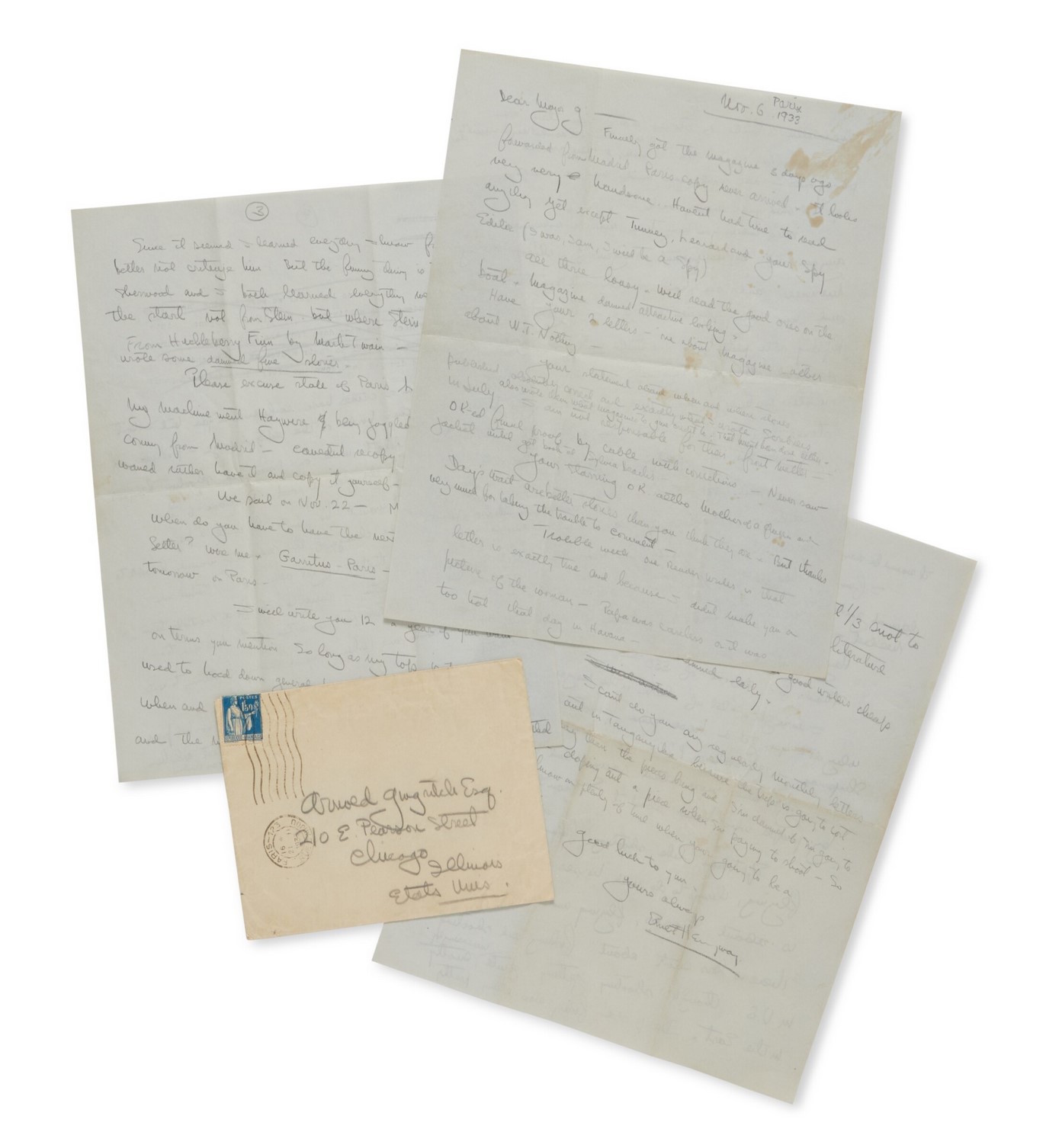
A wide-ranging letter to Arnold Gingrich ("Dear Major G"), editor of the newly minted "Esquire" magazine, written ten days after the publication of "Winner Take Nothing". Half of the letter is about writing short stories; the rest concerns Esquire (Hemingway’s comments on the first issue, his editorial advice, his arrangements with the magazine, etc.): "Your statement [in a recent letter] about when and where stories published absolutely correct and exactly what I wrote Scribners in July. Also wrote them what magazines to give credit to. That hasn’t been done either. I am not responsible for their front matter. OK-ed final proof by cable with corrections. Never saw jacket until got book at Sylvia Beach’s [Shakespeare and Co. in Paris] [...] 'Mother of a Queen' and 'Day’s Wait' [stories in 'Winner Take Nothing'] are better stories than you think they are. But thanks very much for taking the trouble to comment. Trouble with 'One Reader Writes' [another story in the book] is that letter is exactly true and because I didn’t make you a picture of the woman. Papa was careless or it was too hot that day in Havana. I’ve written 3 books of stories now and there are 2 unsuccessful ones in the 3 books. I mean that [they] don’t do what they are supposed to do. There are no phony ones [...] Also when you have the time mark a volume - any one - of De Maupassant, Turgenieff, Chekov, Kipling, Merimee and see how you come out on stars and how many phonies there are. Turgenieff and Kipling rate plenty high. I’ve written more good stories and as good stories as Turgenieff - already. Kipling wrote 20 times as many and a damned sight better stories than I have. But I am going to get better as I get older and he didn't. So may have a chance. All right - Take a book of stories by [Sherwood] Anderson, [Morley] Callaghan, Faulkner and Co. Shit. I don’t compete with those punks. Faulkner will go straight for a damned fine wonderful first paragraph - Then get tired and start faking all over the place - Morley was damned honest but dull. He’s still dull. Since it seemed I learned everything I know from Sherwood better not criticize him. But the funny thing is that Sherwood and I both learned everything we knew at the start not from Stein but where Stein learned it - From Huckleberry Finn by Mark Twain. Anderson, however, wrote some damned fine stories [...]".
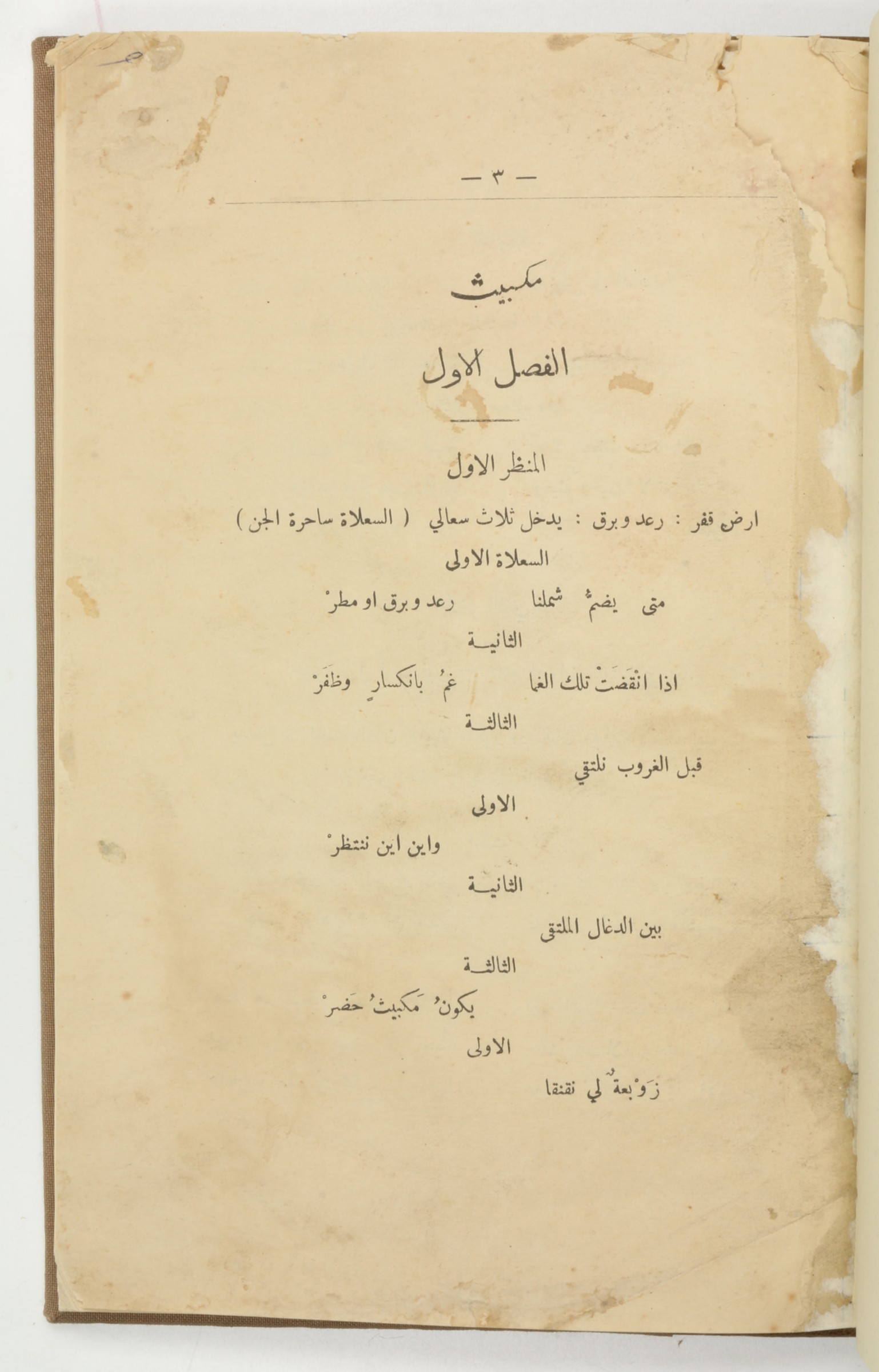
First Arabic edition thus of Shakespeare's play "Macbeth", and the first to be based on the original Shakespearean text. A previous translation by 'Abd al-Malik Iskandar and Jirjis 'abd al-Malik, supposedly produced in 1900, is lost. Another Arabic translation, by Khalil Muthrani, was published also in 1911, but it was based on the French version rather than the English text. A translation in Ottoman Turkish, by Abdullah Cevdet (Karlidag), had appeared in Cairo as early as 1909.
Interestingly, the present translation, in verse, was staged before appearing in book form: in early 20th century Egypt, foreign plays appealed foremost to theatregoers rather than to readers. The appearance of the dramatic text in print, therefore, implied not so much a broadening of cultural interests among intellectuals as a commercial stage success on which the publisher was eager to cash in.
Muhammad 'Iffat provides a verse dedication that reads: "Our Arabisation is dedicated to the whole world; to every writer, poet or scholar", adding a special dedication to the "virtuous scholar" (al-'alim al-Fadil) Tabuz Zada Husayn Rushdi Pasha, then Foreign Minister of Egypt. 'Iffat describes himself as "the son of Khalil Pasha 'Iffat'". Muhammad 'Iffat, who has already translated "The Tempest" (1909), was an Arabic judge in civil courts and a correspondent of Christiaan Snouck Hurgronje (1857-1936).
Wants title-page; the text is complete with index and colophon. Marginal chippings to a few pages, not affecting the text. Minor stains and flaws to several leaves; a small stain to the lower corner throughout the last forty pages. Overall a good copy. Very rare; OCLC lists a single holding library (Yale).
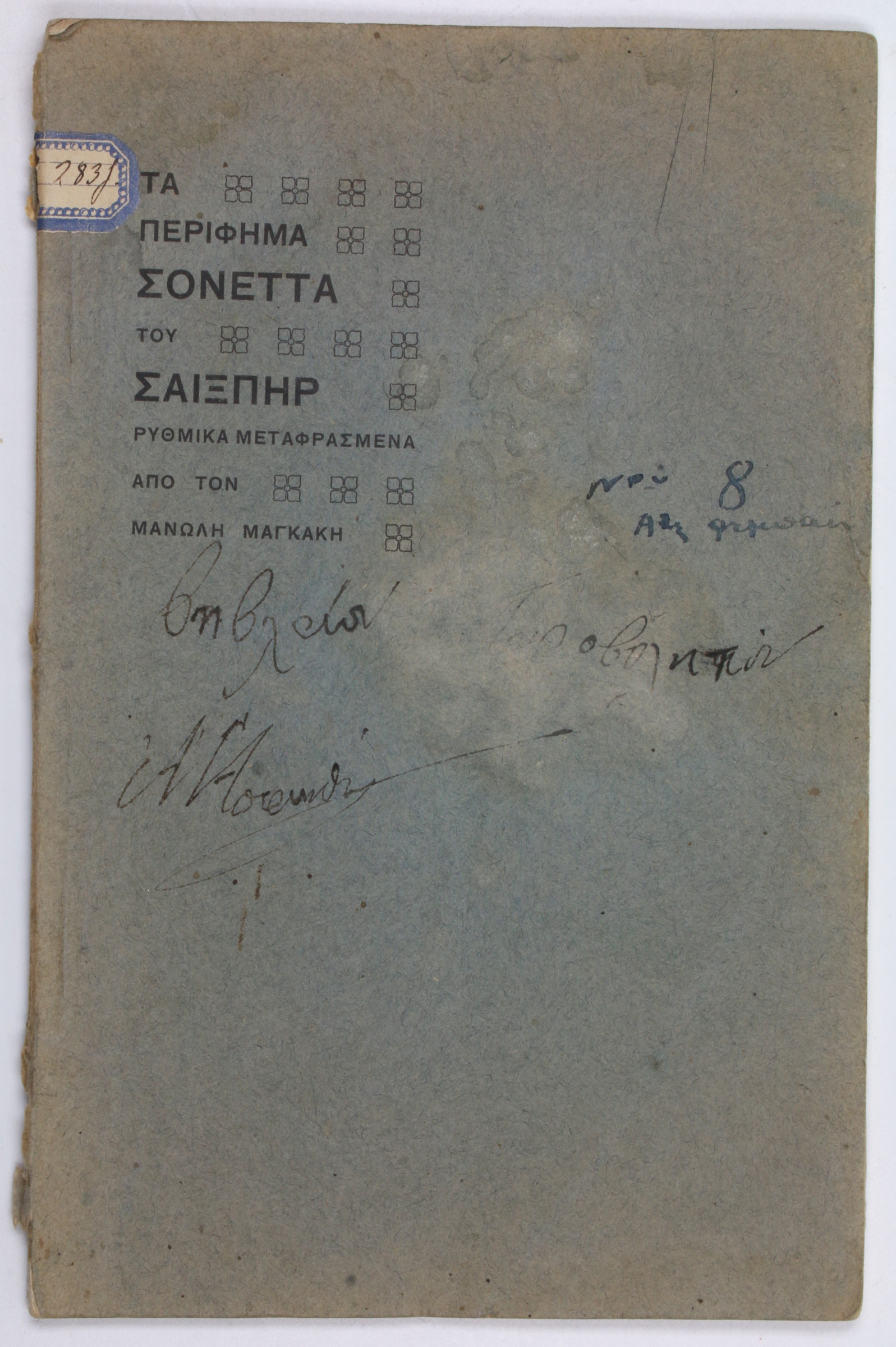
Only edition: the first Greek translation of Shakespeare's Sonnets. The selection includes Sonnets 1, 100, 14, 17, 22, 27, 31, 38, 44, 71, 91, 145, and 149, but also specimens from "Venus and Adonis" and "The Passionate Pilgrim". This copy contains several autograph corrections in ink by the translator, Manolis Mankakis (1891-1918), which correspond to those in the copy in the Library of the Hellenic Parliament in Athens.
Wrappers chipped at the spine and a little stained, with old ink annotations. Very rare: OCLC records only two copies in research libraries (at Princeton and the SUB Hamburg).
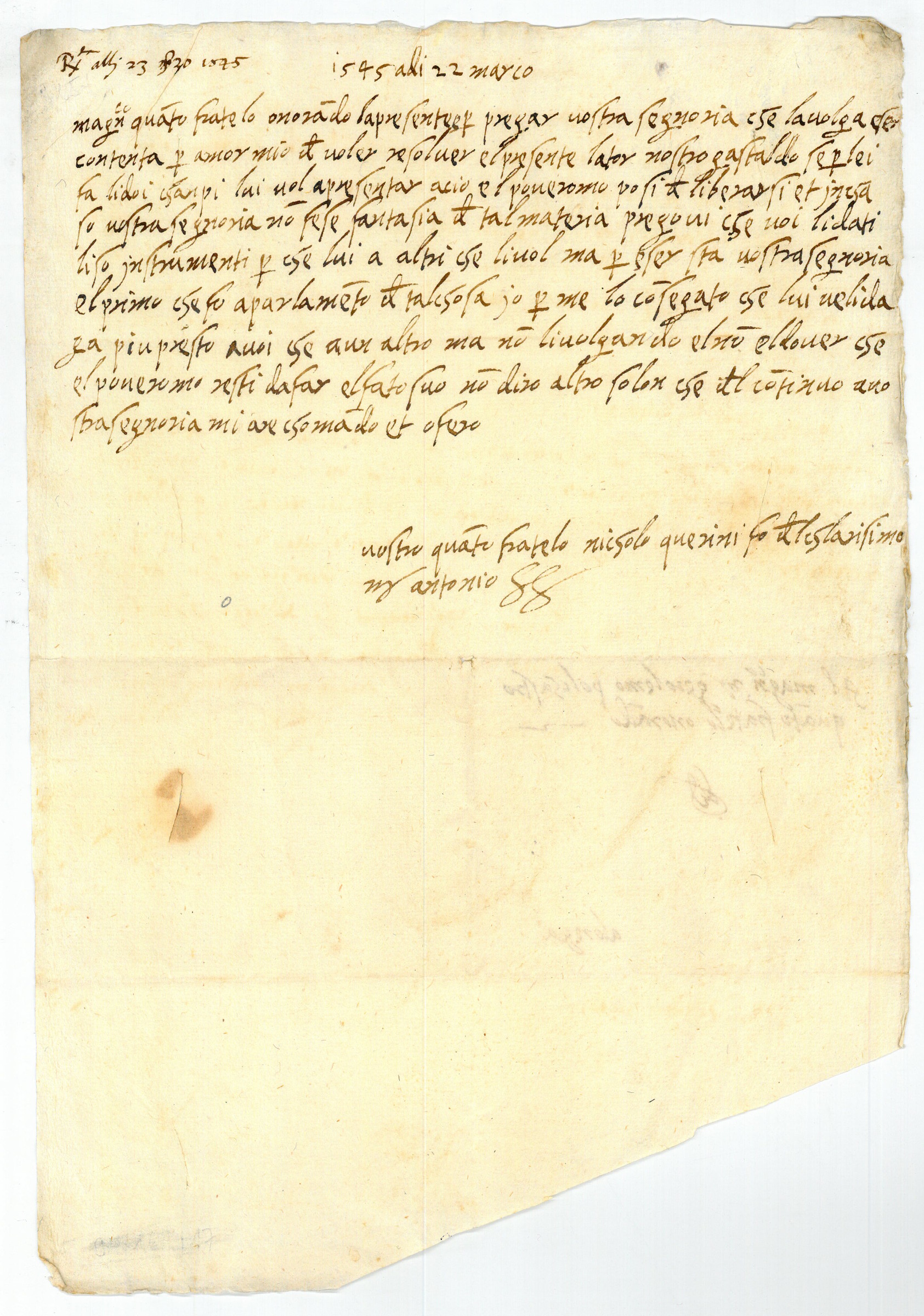
Letter of recommendation to Girolamo Polcastro: "magn[ifi]co quanto fratelo onorando la presente e per pregar vostra Segnoria che la vol gader contenta per amor mio et voler resolver el presente lator nostro gastaldo [...] che el poveromo resti da far el fato suo non diro altro solon [!] che il continuo a vostra segnoria mi ancho mando et ofero".
In 1901, the Italian historian Cesare Augusto Levi (1856-1927) unveiled a copy from 1542 of slightly earlier letters by Antonio Calgeri, a Venetian living in Candia (Crete), decrying the physical abuse of Palma Querini at the hands of her jealous husband and cousin Nicolò Querini. Unlike Othello, Querini did not murder his wife, who returned to her family, but the similarities between Calgeri's account and Shakespeare's tragedy are striking. In one of the letters, Calgeri even prompted the recipient to bring the case to the attention of the Council of Ten. At some point, Querini sued his wife's family and was ordered to Venice for an investigation, where he was murdered several years later. The nickname "moro" was common in Venice for people with a darker complexion, not necessarily indicating African or Arabian ancestry. Shakespeare's plot is undoubtedly based on Giovanni Battista Giraldi Cinthio's 1565 tale "Un Capitano Moro" that might have been inspired by the story of Nicolò and Palma Querini. The fact that the wealthy and powerful Querini were excluded from the office of the Doges for participation in Bajamonte Tiepolo's conspiracy against the Doge Pietro Gradenigo in 1310 certainly added zest to stories about members of the family. Finally, several family members participated in the Venetian wars against the Ottomans in the Mediterranean.
The letter's recipient is likely a descendant of the physician Sigismondo Polcastro (1384-1473), professor at Padua. This interesting letter documents long-standing ties between the two families, as the politician Girolamo Polcastro (1763-1839) was married to Caterina Querini Stampalia.
With two tears from breaking the seal. Lower right corner clipped. Very light browning.
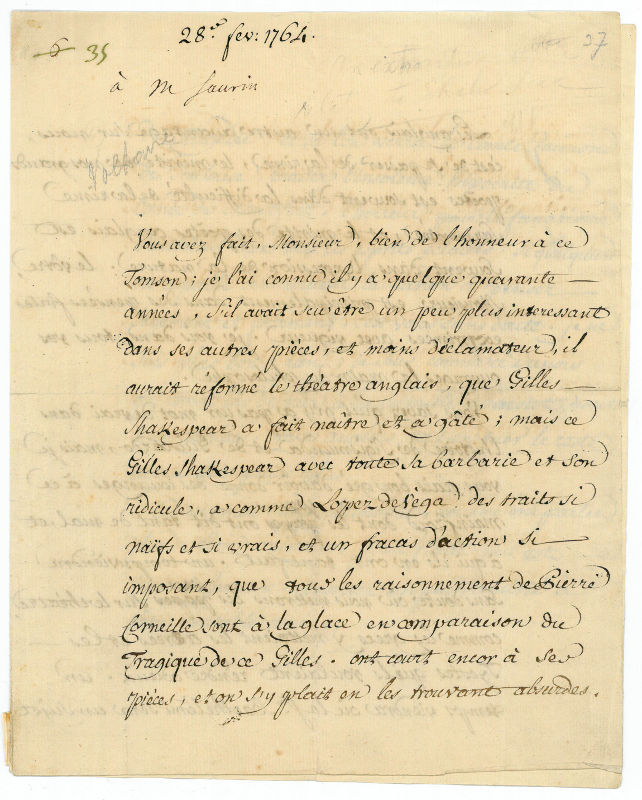
The newest tragedy by Saurin, "Blanche et Guiscard, tragédie imitée de l'anglais de Tancred and Sigismunda de Thomson", gives Voltaire a reason to repeat his aversion to Shakespeare and English theatre: "Vous avez fait, monsieur, bien de l'honneur à ce Tomson. Je l'ai connu il y a quelque quarante années. S'il avait scu être un peu plus interessant dans ses autres pièces, et moins déclamateur, il aurait transformé le théâtre anglais, que Gilles Shakespear a fait naître et à gâté, mais ce Gilles Shakespear avec toute la barbarie et son ridicule, a comme Lopez de Véga des trais si naïfs et si vrais, et un fracas d'actions si imposant, que tous les raisonnements de Pierre Corneille sont à la glace en comparaison du tragique de ce Gilles [...] Les anglais on un autre avantage sur nous, c'est de se passer de la rime. Le mérite de nos grands poëtes est souvent dans la difficulté de la rime surmontée et le mérite des poëtes anglais est souvent dans l'expression de la nature [...] Vous savez il n'y a pas un mot de vrai dans l'histoire de Sigismunda et Guiscardo, mais je vous sais bon gré d'avoir donné des louanges à ce Mainfroid dont les papes [biffé et réécrit] ont dit tant de mal [...] Un temps viendra où la St Barthelémi sera un sujet de tragédie [...]".
Voltaire. Correspondance. Édition Theodore Besterman. Vol. VII. Paris: Gallimard, 1981, lettre 8186, pp. 589-590.
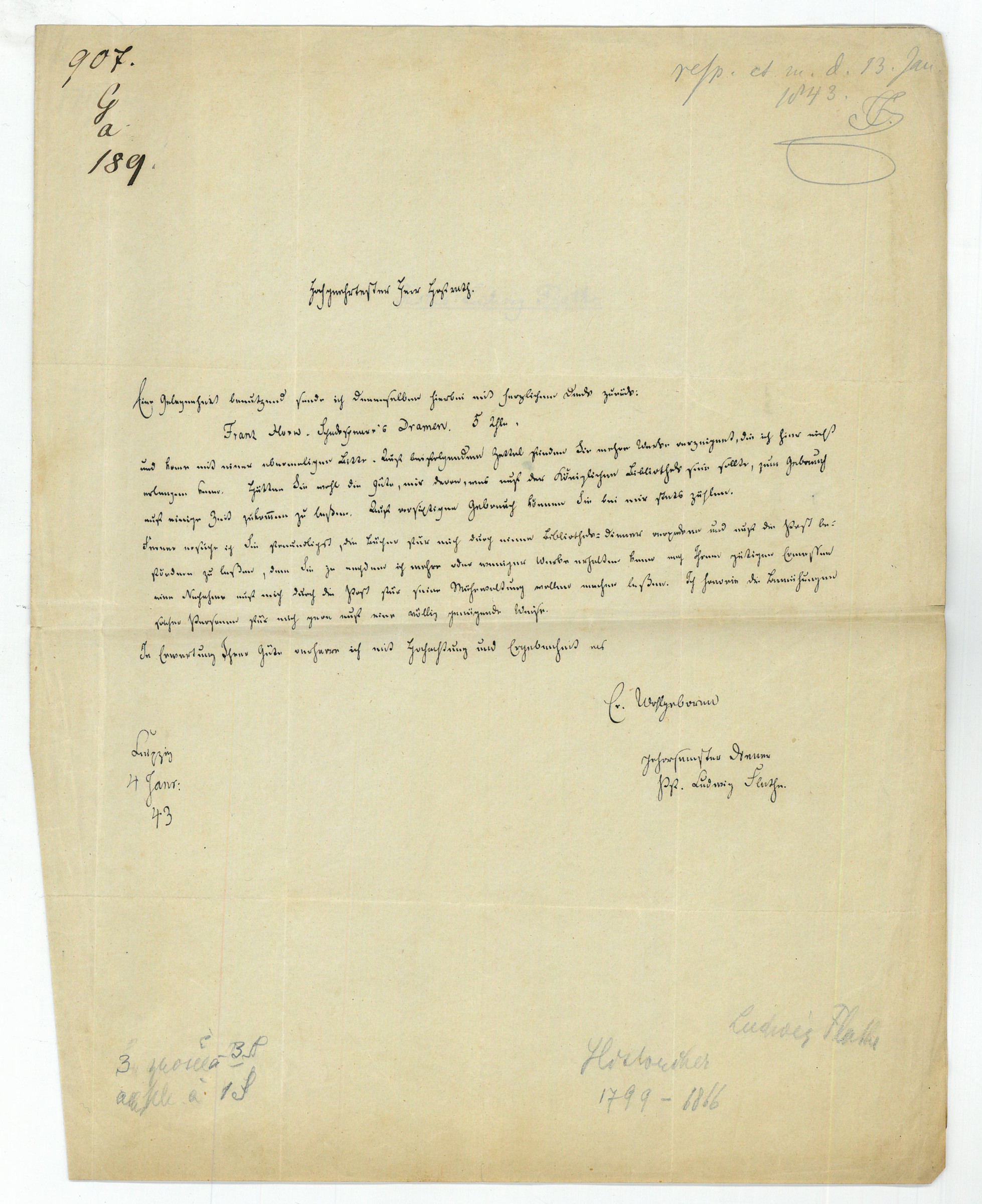
Sendet das Buch "Franz Horn. Shakespeare's Dramen" zurück und bittet den Adressaten, Hofrath Dr. Falkenstein in Dresden, um die Zusendung von mehreren Werken aus der königlichen Bibliothek (der ursprünglich beigelegte Zettel mit den gewünschten Werken nicht überliefert).
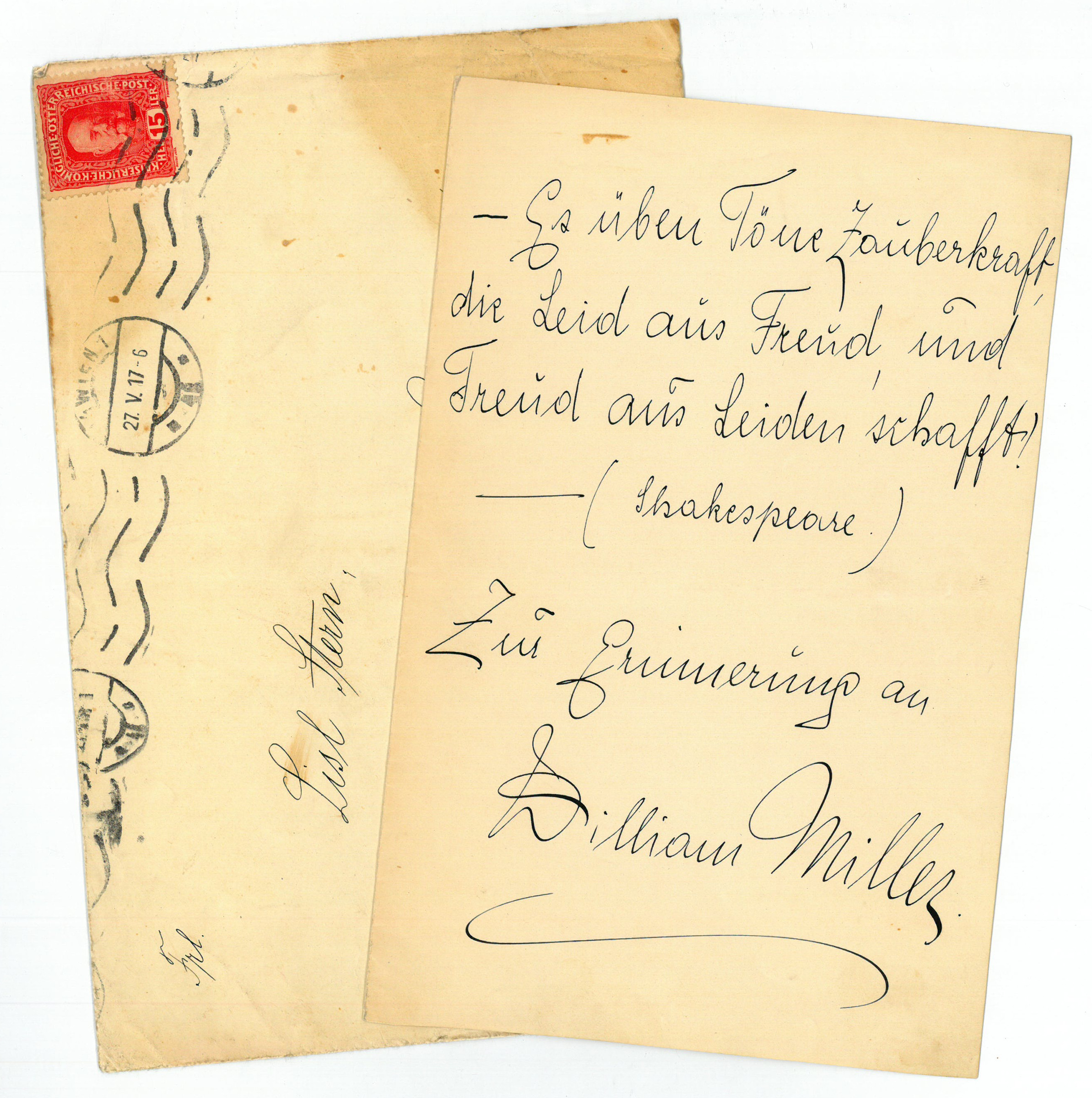
An Frau Lisl Stern: "- Es über Töne Zauberkraft, die Leid aus Freud, und Freud aus Leiden schafft! - (Shakespeare)".
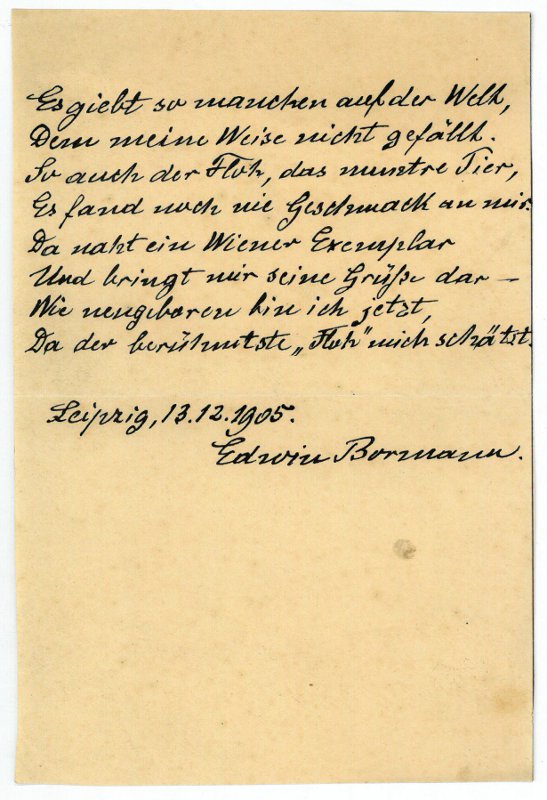
"Es giebt so manchen auf der Welt, | Dem meine Weise nicht gefällt. | So auch der Floh, das muntre Tier, | Es fand noch nie Geschmack an mir. | Da naht ein Wiener Exemplar | Und bringt mir seine Grüße dar - | Wie neugeboren bin ich jetzt, | Da der berühmtste 'Floh' mich schätzt".
Edwin Bormann gründete 1888 für die Publikation seiner Werke einen eigenen Verlag und rief 1909 gemeinsam mit Georg Bötticher und Arthur von Oettingen die Künstlervereinigung Leoniden ins Leben. "Bormann trat vor allem als sächsischer Mundartdichter hervor. Daneben verfaßte er Gedichtkollagen wie seine 'Schilleressenz', in denen er nach Art des Cento Zitate zu einem neuen Text montierte. Der Titel seines Buchs 'Jedes Thierchen hat sein Pläsierchen' ging in den deutschen Zitatenschatz ein. In mehreren Publikationen trat er außerdem für die sogenannte Shakespeare-Bacontheorie ein, die Francis Bacon für den Verfasser der unter dem Namen des Schauspielers William Shakespeare veröffentlichten Werke hält. Im Gegensatz zu anderen Vertretern der Theorie versuchte er - nach eigenem Bekunden - den Nachweis zu erbringen, indem er einen 'unauflöslichen Zusammenhang’ zwischen den Shakespeare-Dichtungen und den naturwissenschaftlich-philosophischen Werken Bacons aufzeigte. So sei der 'Sturm' eine Parabel zu Bacons Naturphilosophie, 'Lear' zur Ökonomie und 'Hamlet' zur Anthropologie“ (Wikipedia).
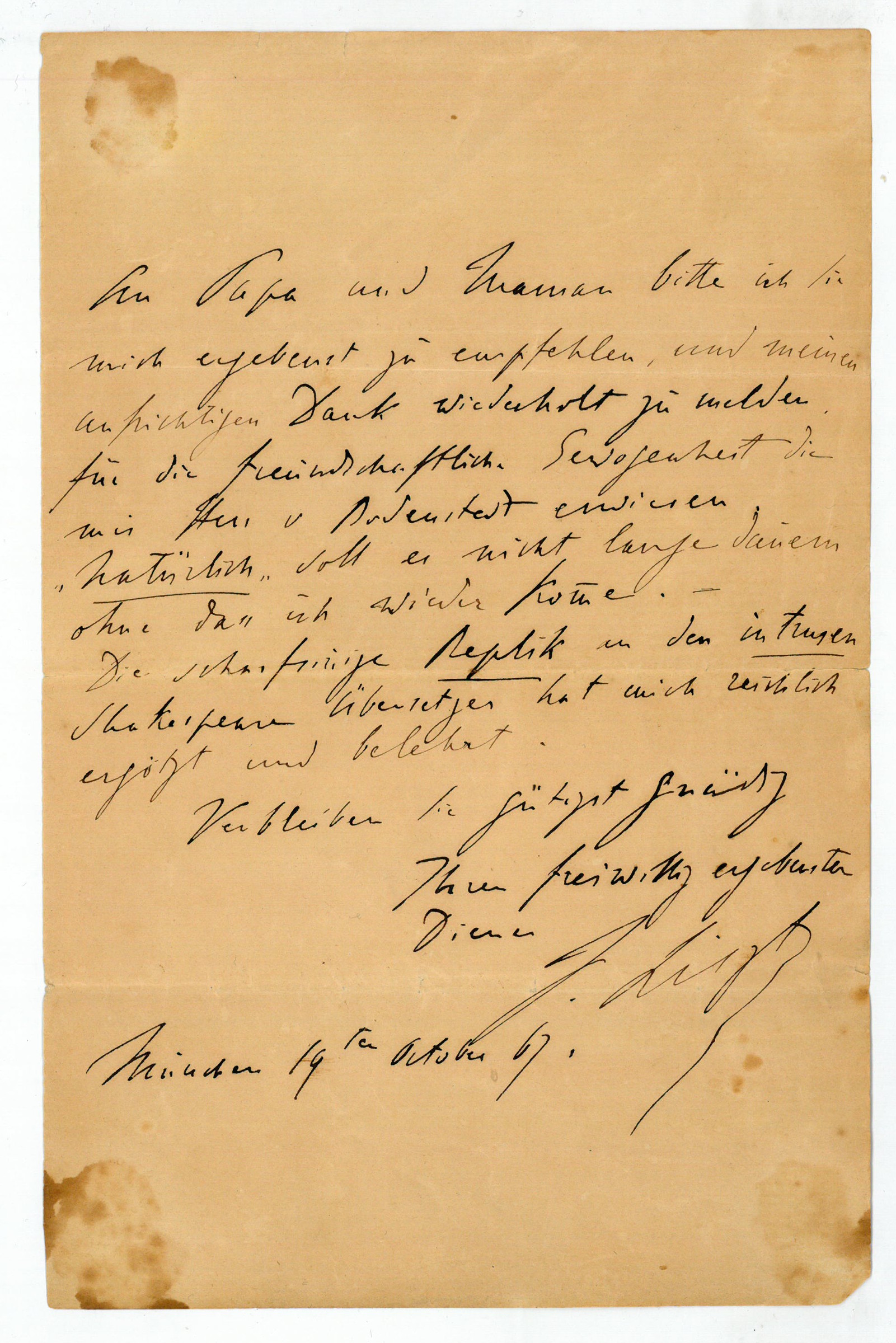
An eines der Kinder von Friedrich von Bodenstedt und dessen Frau Mathilde, geb. Osterwald: "An Papa und Maman bitte ich Sie mich ergebenst zu empfehlen, und meinen aufrichtigen Dank wiederholt zu melden, für die freundschaftliche Gewogenheit die mir Herr v[. Bodenstedt erwiesen. 'Natürlich' soll es nicht lange dauern ohne dass ich wieder komme. Die scharfsinnige Replik an den intrusen Shakespeare Übersetzer hat mich reichlich ergötzt und belehrt [...]".
Friedrich von Bodenstedt war 1867 nicht zuletzt wegen seiner vielgerühmten Shakespeare-Studien Intendant des Hoftheaters in Meiningen geworden. Liszt hatte dort im selben Jahr mit der Meininger Hofkapelle das Fest des Allgemeinen deutschen Musikvereins ausgerichtet, bei dem neue Werke von ihm selbst sowie von Bülow, Damrosch, Lassen, Draeseke und Volkmann zur Aufführung gekommen waren.
Stärker fleckig und gebräunt und mit Spuren alter Montage.
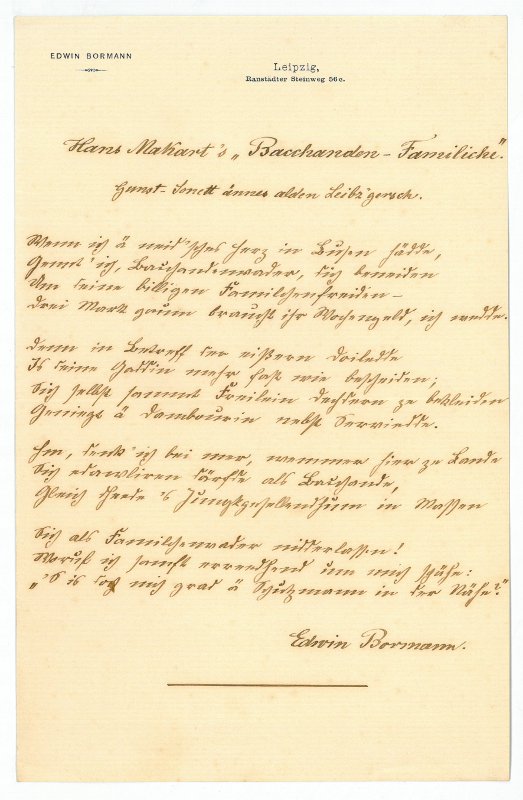
An Alfred Grenser in Wien zur Übersendung des Albumblattes mit einer Abschrift seines Gedichtes "Hans Makart's 'Bacchanden Familiche'. Gunst-Sonett ännes alden Leibz'gersch": "[...] Das Gedichtchen ist meiner soeben bei Braun & Schneider in München erschienenen Sammlung 'Leipziger Allerlei' entnommen und knüpft an ein bekanntes Bild Ihres berühmten Wiener Mitbürgers an. Aber ich hoffe, daß werde von Ihnen noch von Makart selbst (falls ihm das Sonett je vor Augen kommt) die kleine Neckerei mißverstanden wird [...]".
Edwin Bormann gründete 1888 für die Publikation seiner Werke einen eigenen Verlag und rief 1909 gemeinsam mit Georg Bötticher und Arthur von Oettingen die Künstlervereinigung Leoniden ins Leben. "Bormann trat vor allem als sächsischer Mundartdichter hervor. Daneben verfaßte er Gedichtkollagen wie seine 'Schilleressenz', in denen er nach Art des Cento Zitate zu einem neuen Text montierte. Der Titel seines Buchs 'Jedes Thierchen hat sein Pläsierchen' ging in den deutschen Zitatenschatz ein. In mehreren Publikationen trat er außerdem für die sogenannte Shakespeare-Bacontheorie ein, die Francis Bacon für den Verfasser der unter dem Namen des Schauspielers William Shakespeare veröffentlichten Werke hält. Im Gegensatz zu anderen Vertretern der Theorie versuchte er - nach eigenem Bekunden - den Nachweis zu erbringen, indem er einen ‚unauflöslichen Zusammenhang’ zwischen den Shakespeare-Dichtungen und den naturwissenschaftlich-philosophischen Werken Bacons aufzeigte. So sei der 'Sturm' eine Parabel zu Bacons Naturphilosophie, 'Lear' zur Ökonomie und 'Hamlet' zur Anthropologie“ (Wikipedia).
Jeweils auf Briefpapier mit gedr. Briefkopf.
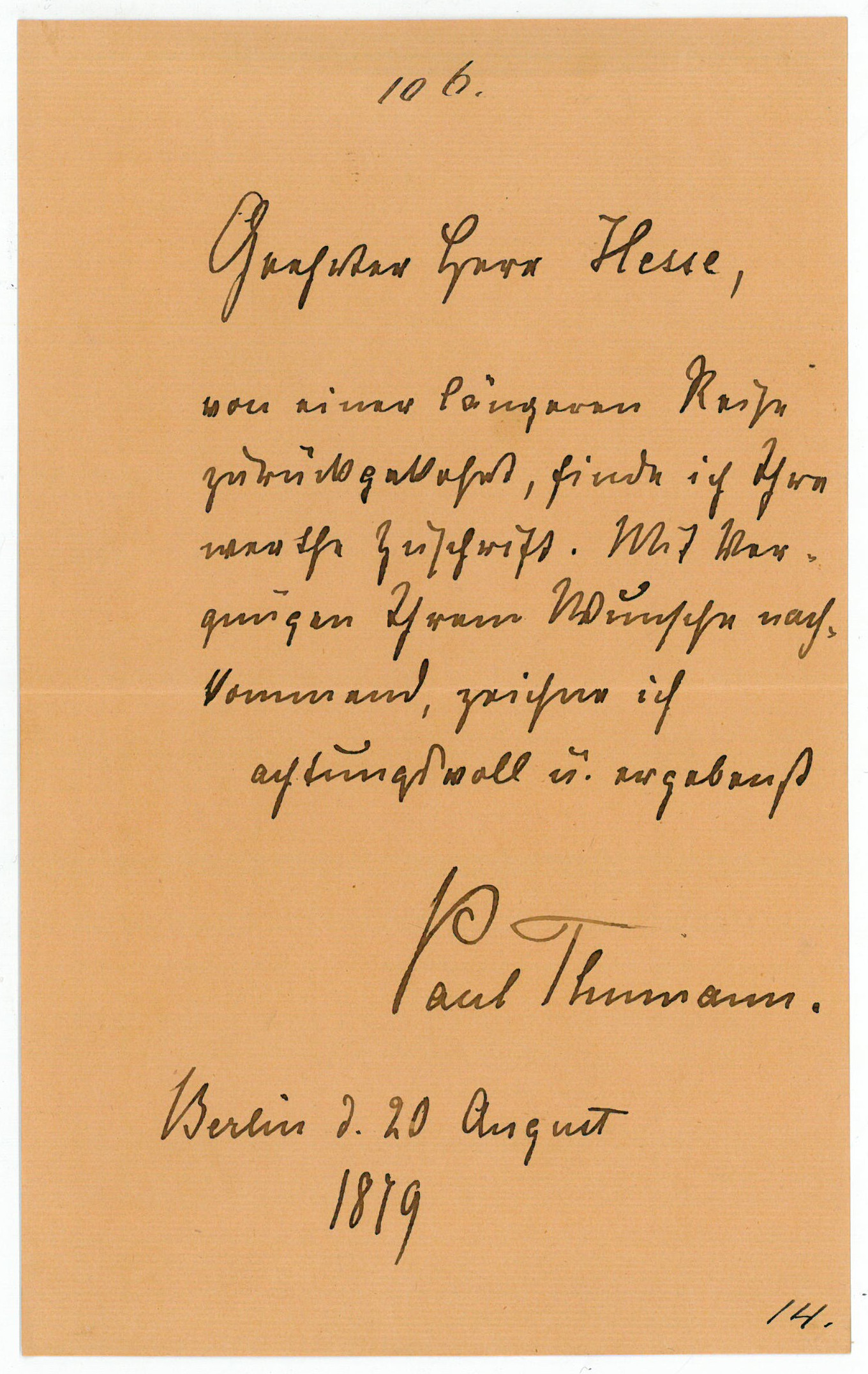
An Herrn Hesse: "von einer längeren Reise zurückgekehrt, finde ich Ihre werthe Zuschrift. Mit Vergnügen Ihrem Wunsche nachkommend, zeichne ich […]".
Neben Illustrationen zu Dichtungen von Goethe, Schiller, Shakespeare und anderen schuf Thumann Historien- und Genrebilder sowie Porträts.

Affiche mit der Ankündigung dreier Veranstaltungen: "Im bevorstehenden Sommersemester denke ich folgende Vorlesungen zu halten: publice über Shakespear's King Lear [...]".
Der Bonner Universitätsprofessor ist besonders für seine 1854-60 veröffentlichte Shakespeare-Ausgabe bekannt. Der Lehrstuhl für Anglistik, den er erhalten sollte, war der erste in Deutschland.
Mit vier Nadellöchern von der ursprünglichen Affichierung.

"Manche Dinge hören auf schwer zu sein, von dem Augenblicke an, wo man sich entschließt sie leicht zu finden".
Ida Bauer stand bevorzugt als sentimentale Liebhaberin in Marburg an der Drau, Hermannstadt, Linz, Graz, Berlin und Wien auf der Bühne. 1898 wurde sie vom Altonaer Theater engagiert, wo sie in Shakespeare-Rollen erfolgreich war, und wirkte dort (mit einer mehrjährigen Unterbrechung am Hoftheater Hannover) bis 1916 in tragenden Rollen.
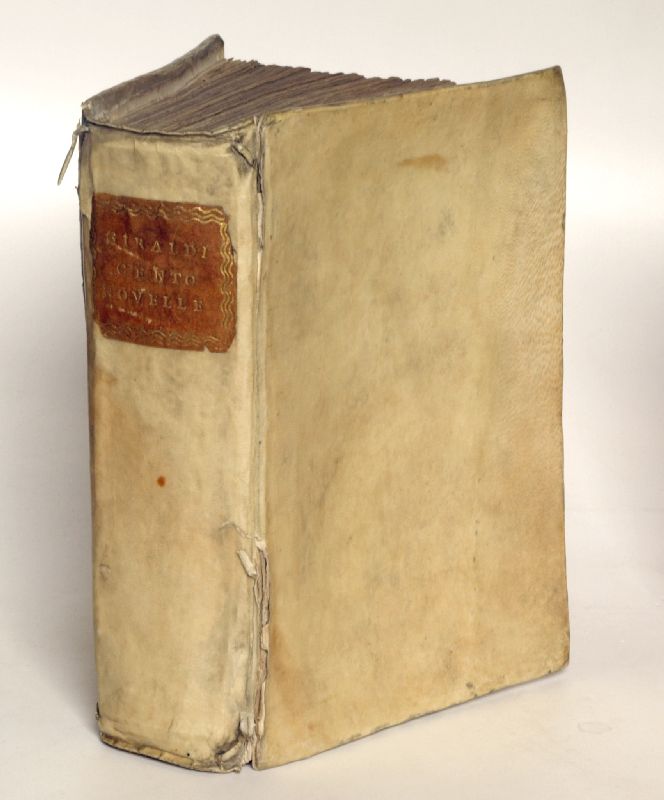
Noch frühe Ausgabe von Giraldis bekanntestem Werk (EA 1565), einer Novellensammlung im Stile Boccaccios und Bandellos, das u. a. Shakespeare die Stoffe für "Maß für Maß" und "Othello" lieferte. Der Literat, Dramatiker, Philosoph und Mediziner Giovanni Battista Giraldi (1504-73) aus Ferrara ist unter dem Namen "Cinzio" bekannt.
Etwas gebräunt bzw. braunfleckig; der zweite Teil stärker wasserrandig. Gelenke angeplatzt.

Dankt Josef Wesely für ihm übersandte Wünsche zum Geburtstag: “Ich habe inzwischen einen ‘Goethe’, ‘Paulus’, Luther’, ‘Katechismus’, 3 Bände ‘Mysterium Christi’, ‘Shakespeare’, ‘Faust’ geschrieben. Aber wann wird es je gedruckt werden? [...]” - Gar nicht; Trenck, der während des Dritten Reichs Mitglied des nationalsozialistischen Rechtswahrerbundes war, sollte nach 1945 bis zu seinem Tod nicht mehr publizistisch hervortreten. Vgl. Kosch IV, 3044 und BBKL XII, s. v.

An das Direktionskomitee des Breslauer Stadttheaters mit der Bitte um Zusendung seines Honorars: "Nachdem ich für die Aufführungen der 'Herrmannschlacht' am Breslauer Stadttheater mich mit dem geringen Honorar von 5% Tantiemen für befriedigt erklärt hatte, sind im verflossenen Winter, nach geraumer Zeit, die Aufführungen des Stückes erfolgt, ohne daß mir bisher der Procent-Antheil oder auch eine Abrechnung darüber zugekommen ist, weder direct noch durch Herrn Röder [...]".
Zu besonderer Berühmtheit gereichten Genée seine Rezitationen von Shakespeare-Dramen und von Kleists "Hermannsschlacht" in einer eigens von ihm entwickelten Vortragstechnik.
Mit Eingangsvermerk in Tinte, leicht braun- und fingerfleckig. Beiliegend einige Zeitungsausschnitte.
















